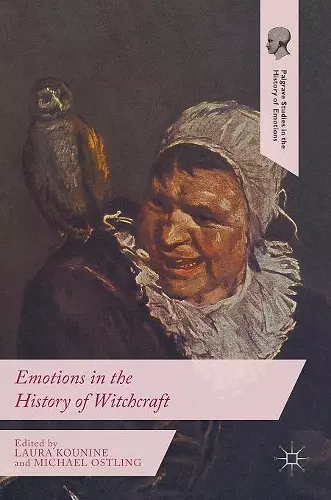Emotions in the History of Witchcraft
Laura Kounine editor Michael Ostling editor
Format:Hardback
Publisher:Palgrave Macmillan
Published:2nd Mar '17
Currently unavailable, and unfortunately no date known when it will be back

"A pioneering as well as profound collection of essays written by leaders in the field who connect the study of witchcraft to cutting edge approaches to the history of emotions. I recommend it to everyone interested in the period." (Professor Ulinka Rublack, University of Cambridge, UK, author of "The Astronomer and the Witch") "The contributors to this volume have boldly charted out new and exciting approaches to witchcraft and the emotions. While ranging across familiar topics like demonologies, trials and comparative treatments of witchcraft, the contributors draw prudently and creatively on insights from anthropology, the neurosciences and evolutionary psychology, feminist theory, and the new theoretical approaches to the history of emotions. In bringing witchcraft studies into the new history of emotions these scholars show emotions not just as interior feelings or cerebral textual and rhetorical devices, but as disturbing and violent actions. This is multi-disciplinary work at its most creative and incisive. A work that will instantly become the starting point for all future discussions of witchcraft and the emotions." (Professor Thomas Robisheaux, Duke University, USA, author of "The Last Witch of Langenburg")
Bringing together leading historians, anthropologists, and religionists, this volume examines the unbridled passions of witchcraft from the Middle Ages to the present. witchcraft as a form of bullying and witchcraft accusation as a form of therapy;Bringing together leading historians, anthropologists, and religionists, this volume examines the unbridled passions of witchcraft from the Middle Ages to the present. Witchcraft is an intensely emotional crime, rooted in the belief that envy and spite can cause illness or even death. Witch-trials in turn are emotionally driven by the grief of alleged victims and by the fears of magistrates and demonologists.
With examples ranging from Russia to New England, Germany to Cameroon, chapters cover the representation of emotional witches in demonology and art; the gendering of witchcraft as female envy or male rage; witchcraft as a form of bullying and witchcraft accusation as a form of therapy; love magic and demon-lovers; and the affective memorialization of the “Burning Times” among contemporary Pagan feminists. Wide-ranging and methodologically diverse, the book is appropriate for scholars of witchcraft, gender, and emotions; for graduate or undergraduate courses, and for the interested general reader.
“Emotions in the History of Witchcraft is a collection of unusual quality and significance that successfully unites two hitherto separate fields to the enormous enrichment of both. … The collection is essential reading for anyone working within the new sub-discipline of the history of the emotions or the more venerable and ever-vibrant field of witchcraft studies.” (James Brown, European History Quarterly, Vol. 47 (4), 2017)
ISBN: 9781137529022
Dimensions: unknown
Weight: unknown
321 pages
1st ed. 2016